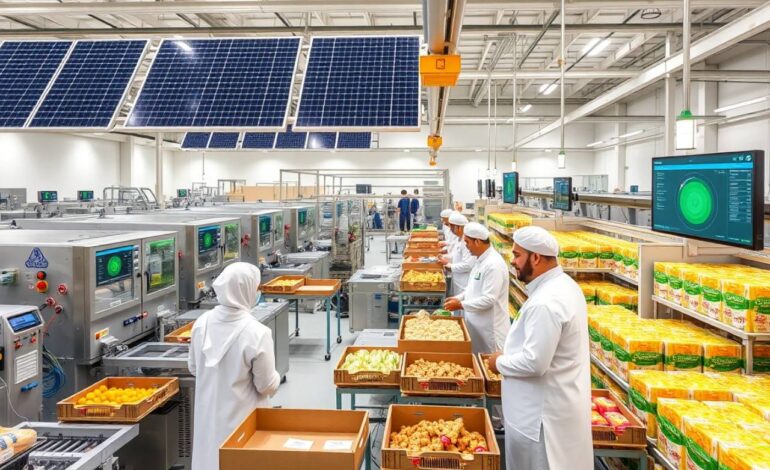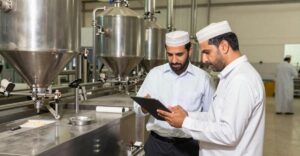Sustainable Food Manufacturing in UAE: Building a Greener Future
The UAE has rapidly positioned itself as a global hub for food manufacturing. With rising consumer demand, population growth, and ambitious government initiatives like the National Food Security Strategy 2051, the country is committed to ensuring a sustainable food supply chain.
However, sustainability is no longer just about meeting government targets — it has become a competitive advantage for food businesses. Consumers in Dubai, Abu Dhabi, and other Emirates increasingly prefer brands that prioritize eco-friendly production, minimal waste, and ethical sourcing.
For entrepreneurs, manufacturers, and investors, this presents both challenges and opportunities. By working with expert Food Business Consultants, companies can integrate sustainability into their strategy while remaining profitable.
Why Sustainability Matters in UAE Food Manufacturing
Sustainability has become a defining factor in the UAE’s food industry because:
- Environmental Responsibility
The UAE faces climate and water scarcity challenges, making sustainable practices essential. Manufacturing that reduces energy, water, and emissions directly supports the country’s climate goals. - Consumer Expectations
Today’s consumers are more informed and health-conscious. They prefer brands with eco-labels, clean-label products, and ethical sourcing. - Government Policies
Initiatives like Dubai Clean Energy Strategy 2050 and Abu Dhabi Environmental Vision 2030 encourage businesses to reduce their environmental footprint. - Global Competitiveness
Sustainable production boosts credibility in global markets, opening doors to exports and partnerships.
Sustainable Practices in UAE Food Manufacturing
Food manufacturers are adopting multiple approaches to reduce their environmental footprint:
- Energy-Efficient Production
Advanced automation systems and AI-driven solutions reduce waste and energy usage. Many facilities are now using renewable energy sources to power production lines. - Water Conservation
Given the UAE’s arid climate, food factories are installing water recycling systems and precision cleaning technologies. - Waste Management & Circular Economy
Manufacturers are turning food waste into new products — for instance, using by-products from processing as animal feed or renewable energy. - Eco-Friendly Packaging
Companies are moving towards biodegradable, recyclable, or compostable packaging to align with UAE’s plastic reduction initiatives. - Sourcing & Traceability
Sustainable sourcing backed by digital traceability tools ensures raw materials meet environmental and ethical standards.
Challenges in Adopting Sustainable Practices
While the benefits are clear, businesses often face hurdles:
- High Initial Investment – Transitioning to green tech requires significant capital.
- Knowledge Gap – Many businesses are unsure of where to begin.
- Regulatory Compliance – Navigating sustainability standards can be complex.
- Consumer Perception – Eco-friendly products may face pricing challenges in a cost-sensitive market.
This is where expert guidance from Food Industry Consultants becomes crucial.
Role of Food Consultants in Driving Sustainability
At Tech4Serve UAE, we specialize in helping businesses achieve sustainability goals without compromising profitability.
Our services include:
- Green Food Factory Design – As leading Food Factory Design Consultants, we help build energy- and water-efficient facilities.
- Turnkey Solutions – From concept to commissioning, our role as a Turnkey Food Factory Consultant ensures sustainable practices are built in from the start.
- Product Innovation – Our Food Product Development Consultants guide businesses in creating eco-friendly and clean-label products.
- Food Processing Efficiency – With expertise as a Food Processing Consultants, we help minimize waste and maximize efficiency.
- Training & Compliance – Educating teams on best practices for waste management, clean energy, and global sustainability standards.
Global Inspiration: Learning from Sustainable Leaders
- Nestlé has committed to achieving net zero emissions by 2050 and reducing its reliance on virgin plastics.
- Unilever has shifted heavily toward recyclable packaging and sustainable sourcing.
- Locally, UAE-based companies like Agthia and Emirates Bio Farm are spearheading sustainable food production models.
These examples prove that sustainability is not only possible but profitable.
Why Sustainability is the Future of UAE Food Businesses
Integrating sustainability is no longer optional — it’s a necessity for:
- Attracting Global Investors – Green businesses have stronger investment appeal.
- Winning Consumer Loyalty – Eco-conscious buyers prefer sustainable brands.
- Achieving Long-Term Profitability – Reduced waste and energy use lower operational costs.
- Aligning with Vision 2030 & 2051 Goals – Businesses gain government support and recognition.
Conclusion
Sustainable food manufacturing is not just a trend in the UAE — it’s a business imperative. From reducing energy consumption to embracing circular economy models, companies that act now will enjoy long-term resilience and market leadership.
At Tech4Serve UAE, our team of expert Food and Beverages Consultants and Food Consultants can help design, implement, and scale sustainability strategies tailored to your goals.
Whether you’re a startup exploring eco-friendly product development or an established factory aiming for green certifications, we provide end-to-end solutions that align with your vision for growth.
FAQs
Q1. What sustainable certifications are available for food businesses in UAE?
Businesses can pursue ISO 14001, LEED Certification, and HACCP sustainability add-ons.
Q2. Is eco-friendly packaging mandatory in UAE?
While not yet mandatory, the UAE is phasing out single-use plastics, making sustainable packaging a priority.
Q3. Can Tech4Serve help existing factories transition to green manufacturing?
Yes, we specialize in upgrading existing facilities to adopt energy-efficient and sustainable technologies.
Q4. Do sustainable practices increase operational costs?
Initially, yes. However, in the long term, they reduce costs by improving efficiency and minimizing waste.







